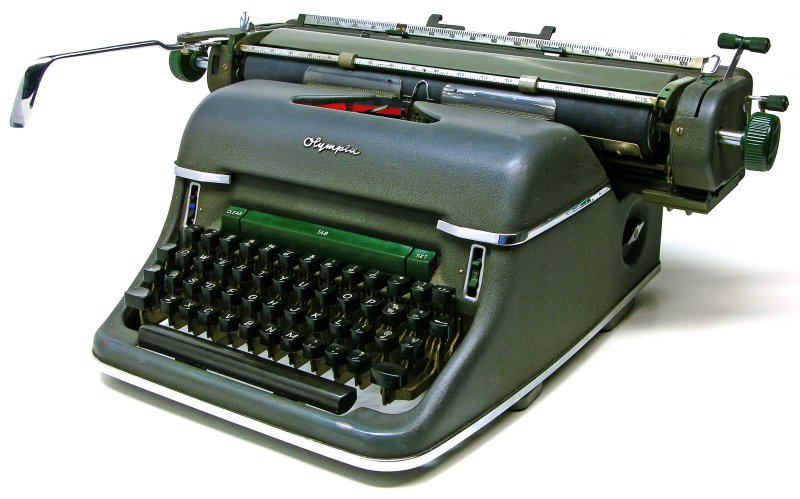 1 2 Jump to
1 2 Jump to
- picker77
- Novice Typer
 Offline
Offline - From: Oklahoma City area
- Registered: 13-9-2017
- Posts: 28
Re: First look inside an SG1 - what an amazing piece of machinery
Finally up and flying, everything is working great. Sticky shift required a super tiny little sideways tweaking of the shift key arm. Could barely feel it drag a touch if I let it slowly, but the slight rough spot was there. The vibrator problem I was dreaming up all kinds of exotic fixes for turned out (as these things often do) to be a dirt simple but subtle fix. The right hand "leaf" (not sure of the correct term) of the ribbon guide that is supposed to smoothly go up and down with each keystroke was ever so slightly bent forward compared to the left side, hard to see with the eye, maybe just a couple of thousandths, but enough to very slightly rub on the right side of the chrome plated wire paper guide behind it during return downward travel. Wondering if that could really be the problem, I very carefully bent it back ever so slightly to visually match the left side, and voila, everything works 100% on all touch settings and on all ribbon color settings. Now I can finally use this thing for some actual work, and boy is it nice to type on! I just wish it was pica instead of elite.
- Fleetwing
- Typewriter Talk Vet
 Offline
Offline - From: Hartford, CT USA
- Registered: 30-6-2015
- Posts: 1,022
Re: First look inside an SG1 - what an amazing piece of machinery
Nicely done! Sometimes those tweaks are all it takes. Is your machine truly elite size (i.e. 12 pitch)? Or is it 11 characters to the inch, which many of the SG1s had? What's the typeface?
- picker77
- Novice Typer
 Offline
Offline - From: Oklahoma City area
- Registered: 13-9-2017
- Posts: 28
Re: First look inside an SG1 - what an amazing piece of machinery
It's definitely 12 pitch, exactly 12 characters to the inch, and from careful comparison with the 1964 NOMDA Blue Book it appears to be Olympia Elite No.87. I have an SM9 that has the 11 pitch Elite No.8 typeface I suppose you're talking about, and another SM9 with Pica No.12. The only machine I own that has an out of the ordinary typeface is a mid-60's Hermes 3000 with Hermes' "Techno Pica" 10 pitch. It's a vertical, very clear typeface, although kind of blocky-looking. Excellent I suppose for for tech manuals, scientificl reports, and such, but not all that pretty to look at. One of these days I'd like to find a machine with a typeface like one of the nice Congressional or Senatorial versions, but they appear to be few and far between.
- •
- Fleetwing
- Typewriter Talk Vet
 Offline
Offline - From: Hartford, CT USA
- Registered: 30-6-2015
- Posts: 1,022
Re: First look inside an SG1 - what an amazing piece of machinery
I've actually got two SG1s with the Congress typeface (11 pitch), so I assumed there are a lot of them out there. It is indeed a very handsome typeface, so keep your eyes peeled. I also have another in pica pitch; I forget which typeface offhand. You didn't mention (and your pictures don't show) whether yours came with the frequently missing paper support -- if so, that's a nice bonus. None of mine has it!
- picker77
- Novice Typer
 Offline
Offline - From: Oklahoma City area
- Registered: 13-9-2017
- Posts: 28
Re: First look inside an SG1 - what an amazing piece of machinery
I'll keep an eye out. I'd like to have at least one more SG1 if I can find one I can afford. No, mine didn't come with a plastic paper support. In fact, I didn't even know such a thing existed until I saw the parts diagrams in the repair manual. It looks like that paper guide might have been the only easily-breakable part on the whole machine, so it's not surprising not many survived. Have any of the SG1 club members who has a surviving sample checked online into having some replicas made by a 3-D printing outfit? Cost is coming down dramatically for work like that, and it seems like that would be something club folks would jump on. I know I'd be happy to buy a replica for my SG1. Technology marches on!
- •
- Ektagraphic
- Touch Typist
 Offline
Offline 
- From: Mass.
- Registered: 05-10-2014
- Posts: 146
Re: First look inside an SG1 - what an amazing piece of machinery
Drool drool drool! Thanks for sharing! I'm yet another big fan of the SG1. Very glad to hear that you got yours working! I would love to add another to my collection if I can come across one. Really, truly, such a wonderful piece of art.
- Ektagraphic
- Touch Typist
 Offline
Offline 
- From: Mass.
- Registered: 05-10-2014
- Posts: 146
Re: First look inside an SG1 - what an amazing piece of machinery
picker77 wrote:
I'll keep an eye out. I'd like to have at least one more SG1 if I can find one I can afford. No, mine didn't come with a plastic paper support. In fact, I didn't even know such a thing existed until I saw the parts diagrams in the repair manual. It looks like that paper guide might have been the only easily-breakable part on the whole machine, so it's not surprising not many survived. Have any of the SG1 club members who has a surviving sample checked online into having some replicas made by a 3-D printing outfit? Cost is coming down dramatically for work like that, and it seems like that would be something club folks would jump on. I know I'd be happy to buy a replica for my SG1. Technology marches on!
I have often thought the same thing! If I had any experience with 3D printing I would give it a whirl, but unfortunately I do not
- beak
- Key Master
 Offline
Offline 
- From: Qld Australia
- Registered: 24-3-2013
- Posts: 929
Re: First look inside an SG1 - what an amazing piece of machinery
Glad to hear everything tweaked back to working order - SG1s tend to respond well to mending!
I have never really understood why the paper rest is such a delicate item on this tank of a machine. I suppose that once set up in their office, they sat there for years with the likelihood of an accident to the rest was very small - and a replacement part easy to get if there were a mischance. Having just watched some Youtube videos on tinsmiths at work, I guess it would be easy enough to fold some tin (flattened beer can?) or copper (oooh - wouldn't that look nice) into the required form for a replacement paper rest.
Sincerely,
beak.
- Fleetwing
- Typewriter Talk Vet
 Offline
Offline - From: Hartford, CT USA
- Registered: 30-6-2015
- Posts: 1,022
Re: First look inside an SG1 - what an amazing piece of machinery
I was actually pondering the SG1 (and SG3) paper support, and it occurred to me that paper supports on office standard machines were not a common item. For instance, I don't believe the Royals and Underwoods of the same vintage had them, or the Smith Coronas. Am I right? So you can think of the Olympia paper supports as a nice bonus feature, but one that folks made do without just fine. (And users of the machines may have just removed them since they got in the way, and were fragile anyway.)
- Uwe
- Moderator
 Offline
Offline 
- From: Toronto, Canada
- Registered: 12-3-2013
- Posts: 4,410
Re: First look inside an SG1 - what an amazing piece of machinery
A paper rest on a standard model was not a typical feature for North American standards; conversely, many European standards did offer a paper rest as a basic fitment.
In terms of the paper rest used on the SG1, it was not a delicate or otherwise fragile part as was suggested in an prior post, but rather one that was very easily removed from the machine (it's held in place by two metal pins clamped by a pair of spring clips). As a result I believe that most were lost because they were simply detached (intentionally or accidentally) from the machine and then became separated from it as the years passed. Most paper rest systems found on other typewriter models are bolted on the machine, and ironically - especially as is the case with Olympia portables - those were the ones that were more likely to be broken off the typewriter.
The pronoun I has always been capitalized in the English language for more than 700 years.
 1 2 Jump to
1 2 Jump to

